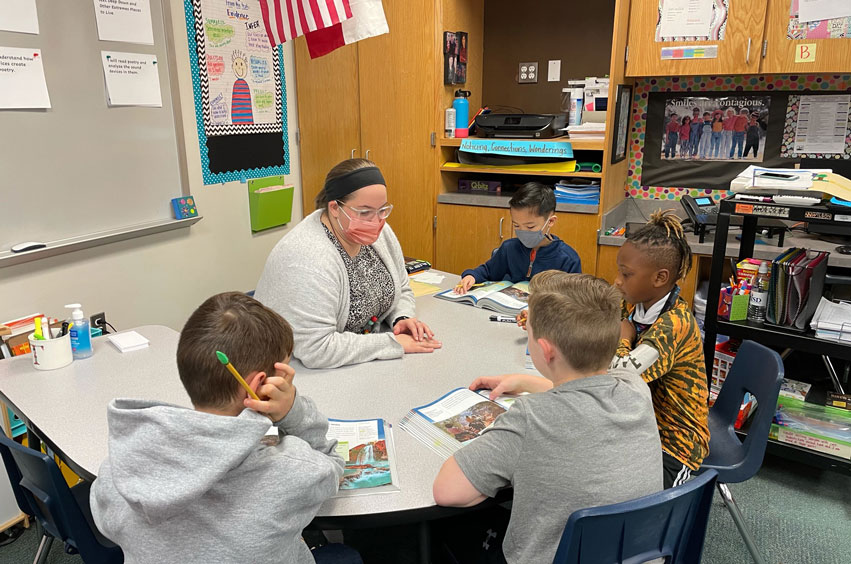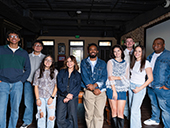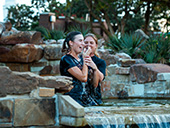Lessons in Student Teaching: Senior Hannah Sullivan
This article is over six months old and may reference former titles for DBU faculty or staff, discontinued programs, or other details that have since changed. If you have any questions, please contact us at news@dbu.edu, or (214) 333-5172.

Hannah Sullivan’s day-to-day schedule doesn’t cling too tightly to that of a conventional college student. In fact, loading third graders in and out of cars, creating lesson plans, and kneeling to tie the shoes of others are not common tasks for most 18-23 year olds.
In preparation to step out into the world of education on her own, Hannah is in the classroom daily learning from current teachers in her clinical teaching, gleaning information from her professors in her classes on campus, and holding fast to the calling the Lord has placed upon her life.
Hannah currently student-teaches third grade at Thelma Jones Elementary School in Mansfield ISD. For the first half of the spring semester, Hannah was navigating the world of online teaching as she virtually taught first grade from behind her computer screen. Looking back, Hannah recalls the struggle of building relationships with her students without the luxury of being in person. “I had to find creative ways to learn more about the students and build connections," she states.
Returning to in-person teaching, however, brought with it a whole new set of difficulties for Hannah.
“When I moved to my in-person classroom," she explains, "I soon realized it was a challenge to not congratulate a student by giving them a hug or high five.”
Hannah is not discouraged, though; instead, she has found new ways to show her affection to her students by joyously giving air high-fives, elbow bumps, and doing small cheers in celebration of a job well done.
“If I have learned anything from the past year,” Hannah says, “it’s the power of being flexible.”
The normal life of a teacher requires an immense amount of patience, problem solving, and poise. With the addition of the pandemic, educators have been forced to think outside the box even more so than usual.
“Each day that I go to school, I remind myself to be flexible and to stay positive,” Hannah says. “The Lord has placed me in my school in that specific classroom for a reason, and I try and remind myself each day to look for that reason.”
Hannah’s call to education is one that extends beyond simply getting a job after graduation. For Hannah, “there is a difference between wanting something and doing what the Lord has called me to do.”
Hannah remembers an instance in high school where the Lord confirmed her personal mission. While interning at an elementary school in Forney ISD, Hannah was tasked with reading with a student who had autism (and who she noticed had a great curiosity for airplanes). Upon realizing the student’s frustration with reading a book he had no interest in, Hannah asked the teacher if they could read a book on planes instead. This—Hannah’s attentiveness to detail and care for the student—made all the difference.
“To see the student light up with joy showed me this is what I was called to do," Hannah recalls. "I didn’t want to just be a teacher. I wanted to become an educator that brought joy to students and showed them that they are capable.”
Because of the calling placed on her life to teach, Hannah was led to attend college on University Hill.
“DBU was authentic in showing the value of a Christ centered education, and I wanted that," she explains.
The Dorothy M. Bush College of Education has gone above and beyond that of a standard university. With 175 undergraduates in the program currently and with plans to see 34 clinical teachers walk the stage for graduation in May, the College of Education is dedicated to forming Christian educators for an increasingly secular world.
The quality of education DBU students receive is clearly revealed in post-graduation statistics: presently, the College of Education has a 100% hiring rate for graduates entering the education field as well as a 100% pass rate for the state licensure teacher examination.
DBU is committed to giving future educators the tools they need to not only survive, but thrive after graduation. For example, while the state of Texas requires only 30 hours of classroom observation, DBU requires over 200 hours so every teacher is more than prepared when they leave. DBU also follows their educators into the field for three years after graduation to support and ensure alumni success in the classroom.
With plans to graduate with her Bachelor’s degree in Elementary Education on May 13, 2021, Hannah is excited to begin her career as an educator.
“I may not always be allowed to share the story of Christ in the classroom," she says, "but I know that I can easily show Christ’s love to my students, families of students, and coworkers.”
The College of Education is proud to send godly women like Hannah into the field.
Emmalie Ellis writes for the University Communications Department at Dallas Baptist University.








